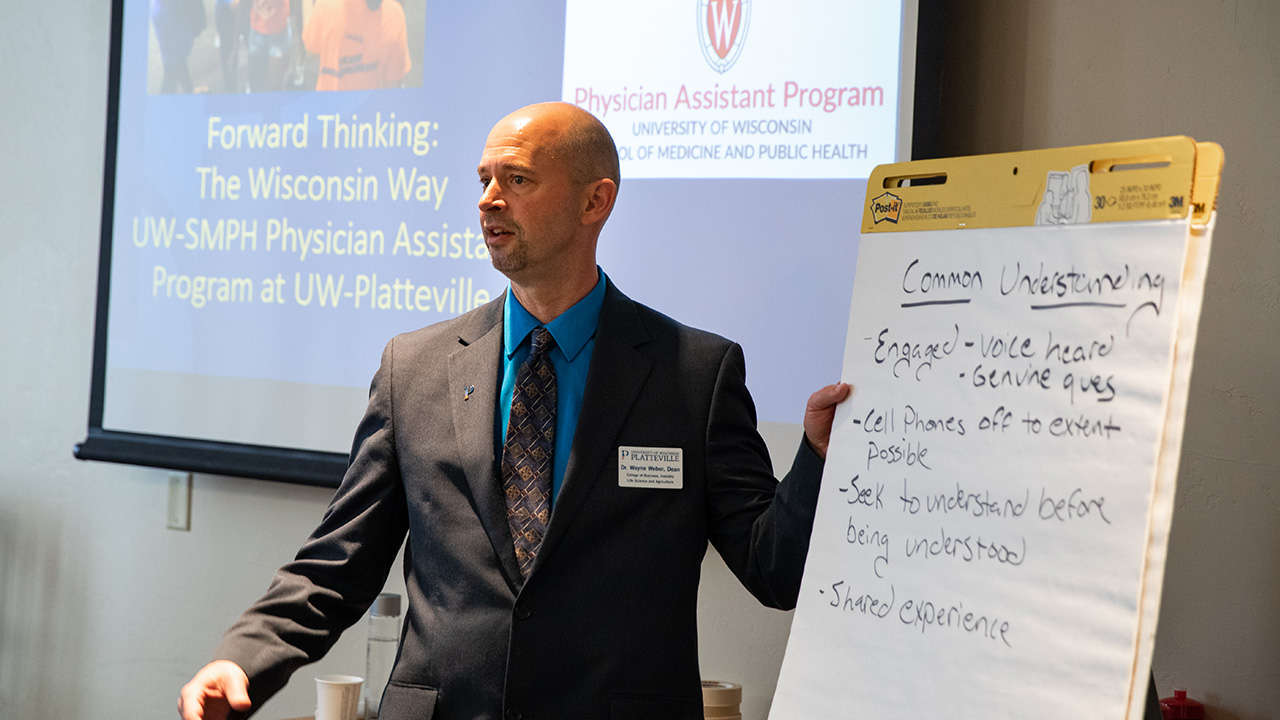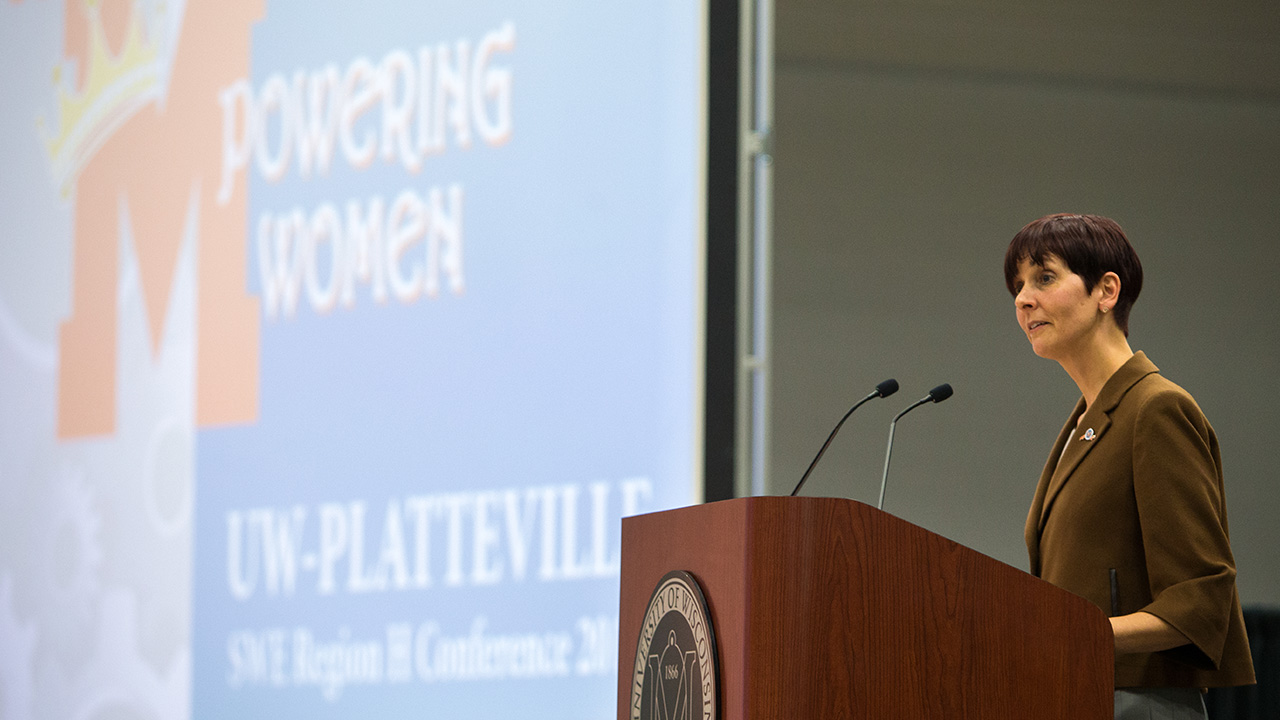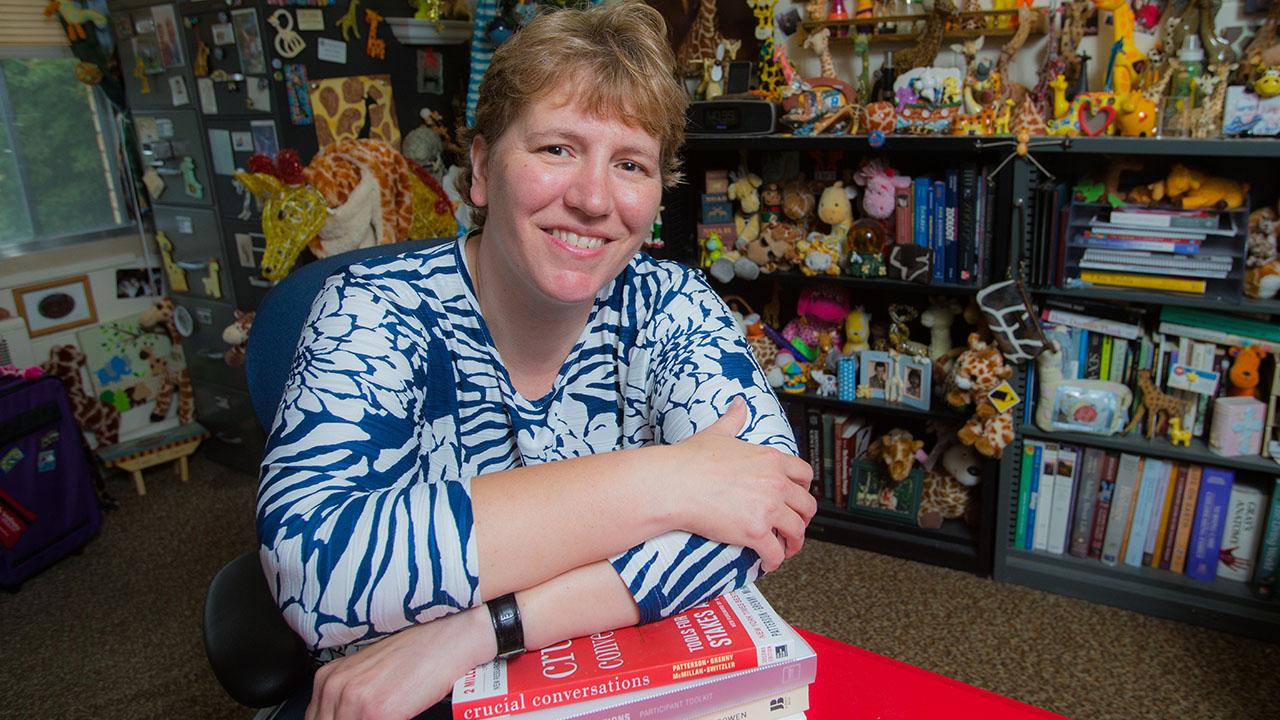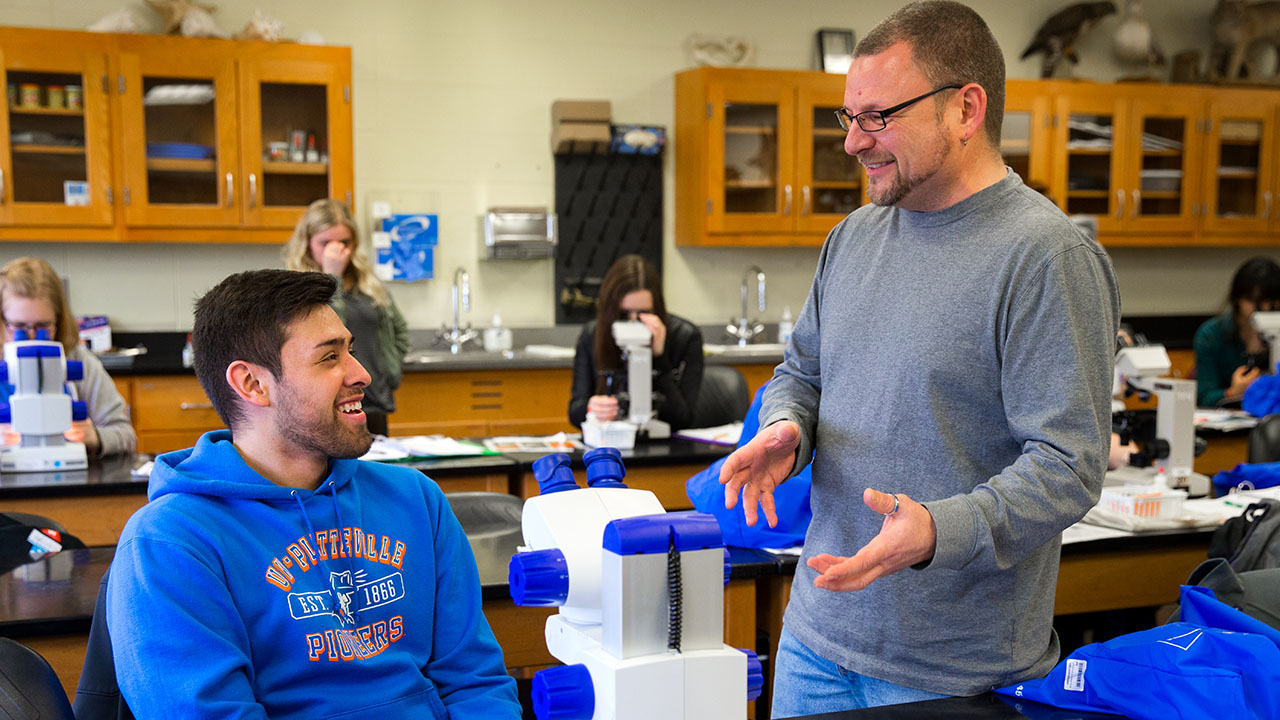



The Department of Campus Climate at the University of Wisconsin-Platteville recognizes administrators and faculty who show commitment to learning and growth in the areas of diversity, equity and inclusion. From participating in professional education programs hosted by the Department of Campus Climate, as well as engaging in personal growth opportunities, the following are recognized by the Department of Campus Climate for their ongoing dedication and leadership: Dr. Molly Gribb, dean of the College of Engineering, Mathematics and Science; Dr. Kristopher Wright, professor of biology; Dr. Wayne Weber, dean of the College of Business, Industry, Life Science and Agriculture; and Dr. Amanda Trewin, department chair and professor of biology. They shared with the Department of Campus Climate some insight into their commitment and journey to growing their competencies and efforts related to diversity, equity and inclusion.
Why do you feel like it’s important for someone in your position to be invested in diversity, equity, and inclusion concepts, strategies and best practices? How does increasing awareness of diversity, equity and inclusion benefit UW-Platteville?
KW: As a biologist, my job is to explore, understand and appreciate life in all its different contexts. From molecules to ecosystems, biologists appreciate that diversity is the fuel of life. Diversity allows for change. Diversity provides options and alternatives. Diversity prevents life from being static and allows it to evolve over time. As a teacher, I help shape the future; that is a responsibility I do not take lightly. I believe it is my duty to help students learn how to learn, think critically, apply knowledge and skills to new situations, and perhaps most importantly, effectively communicate their ideas. To do so, requires that I teach with expectations, approaches and assessments that impart a sense of equality among all students. But I must continually recognize when the legacy of white culture compromises those efforts. I owe it to my students to think much more about this and to address it in my classes.
Increasing awareness of diversity, equity and inclusion benefits UW-Platteville by directly allowing the institution to work towards its mission “…to empower each student to become broader in perspective, intellectually more astute, ethically more responsible, and contribute wisely as an accomplished professional and knowledgeable citizen in a diverse global community.” Without awareness, such a mission is simply impossible to achieve.
WW: As dean of the college, it is of utmost importance for me to be invested in diversity, equity and inclusion concepts, strategies and best practices for many reasons.
As dean, I am the leader of the College of BILSA and I need to provide leadership in the areas of DEI so that we can develop the most inclusive environment possible to leverage the talent of all members in the college. Further, as a leader of the college, I need to also serve as a model in the important engagement in DEI. This is with the complete understanding, and associated humility, that as a middle-aged white male, I am considered the definition of privilege, and, relatedly, I am an active participant on this journey. This also includes the understanding that I need to recognize that I have biases, recognize what those biases are, and work to continually develop personally my understanding of DEI to provide leadership so that we can continue to move forward effectively in the areas of DEI as a college and university.
The data are clear, the more diverse we are as an entity, providing a myriad of perspectives, the more productive and effective we are. However, much more importantly, the more diverse we are, the better positioned we are to benefit from these diverse energies and experience the value that our diversity brings to our collective humanity.
Finally, as a geneticist, and a person of this world, I understand that we are much more different as individuals than we are as groups and that the diversity we do have should be celebrated, not oppressed. I’ll end with one of my favorite quotes by President John F. Kennedy that resonates with me and my commitment to diversity, “The wave of the future is not the conquest of the world by a single dogmatic creed but the liberation of the diverse energies of free nations and free men [people].”
AT: I believe if we are going to make strides in creating a fairer playing field for under-represented groups at our institution, faculty and staff at UW-Platteville need to be invested in diversity, equity and inclusion concepts, strategies, and best practices. I think dismantling the culture around the various “isms” will require buy-in and action from those who find themselves among the privileged. While I don’t claim to have the answers, I do value learning the history that has contributed to our current reality and hope that my efforts do lead to some positive change.
MG: As a woman in engineering, I have often been the first and/or only woman for the better part of my career. I can only imagine how difficult it is for students of color or other groups not traditionally represented in STEM fields to “see” themselves in their degree programs and careers. As a member of the UW-Platteville leadership team, I consider it is my responsibility to ensure that all students, faculty and staff feel welcomed and included on our campus. When I arrived on campus in 2015, one of my first actions was to sign the American Society of Engineering Educators’ Diversity Pledge, in which over 100 deans of engineering schools across the United States committed through specific action to provide increased opportunity to pursue meaningful engineering careers to women and other underrepresented demographic groups.
Six years later, I am very proud of the fact that we have made great strides in terms of gender equity in the college leadership ranks, as well as in the percentage of tenured and tenure-track women in engineering (28% at last count). I am hopeful that these changes are making a difference for our women students, however, I know that we have much more to do to improve the climate for learning and working so that all students can reach their dreams.
I firmly believe that every stride we make to be a more diverse, equitable and inclusive campus benefits everyone.
What education tools have helped you further your knowledge base about diversity, equity and inclusion topics (i.e. trainings, workshops, conferences, podcasts, books, articles, etc.)?
KW: I have participated in various trainings, workshops and seminars related to diversity, equity and inclusion. Highlights would include the White Accountability Dialogues, the Liberal Arts Tuesday morning discussions, and Dr. Isbister’s Inclusive Teaching seminar. I have supplemented these with podcasts (ex. Reveal), articles and videos (ex. 13th). All of these tools have been instrumental in furthering my awareness of diversity, equity, and inclusion.
WW: The activities, events, trainings and organized dialogues provided by these two entities have been, by far, the most impactful in my DEI journey:
- Midwest Culturally Inclusive Conference – I have not missed an MCIC conference and the sessions, events and trainings related to this conference, sponsored by OMSA and our university, has been fantastic.
- White Accountability Dialogues, Inter-Group Dialogues and White Accountability in Higher Education Dialogues – These have all been impactful through not only increasing awareness but through the intensive discussions. I cannot recommend these opportunities enough!
Other resources include the following:
- Damon Williams Training Seminars
- Videos, podcasts, and articles – These have also been informative and important in increasing my personal knowledge base. The following are some examples.
- Code Switch Pod Cast
- Ted Talks
- Videos
- Jeffrey Robinson
- Janet Stovall
MG: Oh, my, I availed myself of many different sources of information over the last year. The most powerful were those in which I joined in a community of others who also wanted to learn: the Campus Climate office sponsored White Accountability and Intergroup Dialogue meetings that were a fantastic way to explore ideas, as was the Podcast Club that followed. I also read several books and articles, and I took advantage of some excellent workshops and conferences sponsored by the American Society of Engineering Education.
What are some things you are doing to infuse inclusion and equity into your personal and/or professional life?
KW: Personally and professionally, I’m trying to continue learning, increase my awareness, and explore approaches that are more inclusive. I have been having more related conversations with my family. I have been writing and/or journaling as an outlet for my thoughts and a means of processing ideas. I’m becoming more comfortable sharing my questions, thoughts and ideas with others. I still have a lot of work to do, but I know that every step is a step in the right direction, because without taking steps (no matter how small) there can be no change.
AT: In my professional role, I am trying to be strategic about infusing diversity, equity, and inclusion into learning activities. I want my students to develop a deeper understanding of these issues earlier than I did. One way that I am trying to do this is through incorporating case studies related to diversity into my classes. This does take time. I have set a goal of adding one case study per semester. I teach Human Anatomy & Physiology and believe that my cases need to be related to course content or students will not take them seriously. During this semester, I developed a case that helps students to explore the development of the reproductive system. Students discover that it isn’t as straight forward as male versus female since chromosomes, gonads, internal genitalia, external genitalia, and gender identity are not consistent in all individuals. Since this is the case, my hope is that they will reason for themselves that it doesn’t make sense for others to define the gender of another.
WW: Being highly-engaged in university trainings, dialogs and events; re-invigorating the College of BILSA DEI Committee; launching the College of BILSA DEI Activity Grants for the first time; being actively involved in Academic Affairs (PAA) development of a PAA DEI strategic plan; and also engaging family, and listening to podcasts and videos at home and in the car, increasing awareness and stimulating excellent conversation with my kids.
What advice, resources, or strategies would you give someone who is new on their journey to better understanding diversity, equity, and inclusion?
KW: You aren’t alone. There are many people who are in the early stages of the journey (heck, there are many people who haven’t started the journey). Open your mind and be ready to engage. Find what works best for you to move along your journey (there’s no one pathway). Know that the journey isn’t going to be easy, but it may be one of the most enlightening and productive journeys you’ll embark on.
AT: My advice to others hoping to better understand diversity, equity, and inclusion is to keep engaging with learning opportunities designed to explore diversity, equity and inclusion. Be open to feeling uncomfortable as learning isn’t always easy. Finally, develop your listening skills to understand rather than rebut.
MG: I love the learning community model as a way for anyone to begin their journey to greater understanding of diversity, equity and inclusion. Because I so appreciated this approach, this spring, we started every College of EMS Executive Council meeting with a short video about implicit bias that we followed with an open discussion. The videos provided a prompt for discussion that supported EMS leaders in their learning.